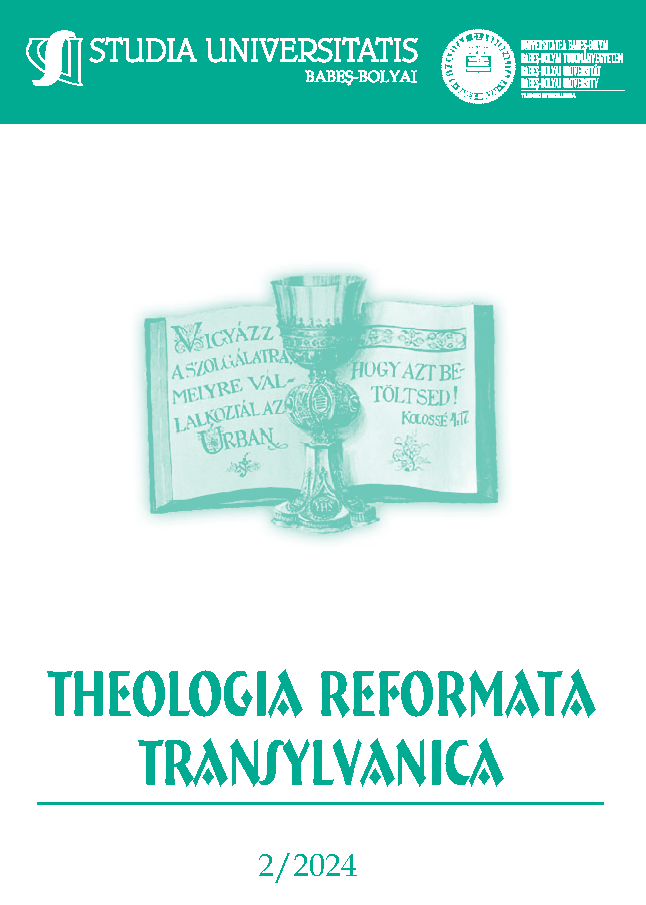Az erőszak, a dominanciaigény és az áldozatállító hatásmechanizmus individuális és társadalmi vonatkozása
Néhány teológiai antropológiai szempont
DOI:
https://doi.org/10.24193/subbtref.69.2.14Keywords:
demand for freedom, lex talionis, collective aggression, scapegoat mechanism, victim, sacrificeAbstract
The Individual and Social Aspects of Violence, the Desire for Dominance, and the Mechanisms of Victimization. Some Anthropological Perspectives. Where does violence come from? Is it an inherent or a learned trait? Has there always been this much violence? What role does the Church play in this context? These are all questions to which we continually seek and manage to provide partial answers. The theological-anthropological perspective is just one of them. We also turn to sociological, philosophical, anthropological, and psychological viewpoints to formulate a complex answer by examining the intersections of these disciplines to understand the source of this corruption in human nature.
References
BABEROWSKI, Jörg (2019): Az erőszak terei. Budapest Európa Könyvkiadó.
BONHOEFFER, Dietrich (2007): Követés. Budapest, Luther Kiadó
CRÜSEMANN, Frank – HUNGAR, Kristian – JANSSEN, Claudia – KESSLER, Rainer – SCHOTTROFF, Luise (szerk.) (2009): Sozialgeschichtliches Wörterbuch zur Bibel. München, Gütersloher Verlagshaus.
DIETRICH, Walter – MAYORDOMO, Moses (2005): Gewalt und Gewaltüberwindung in der Bibel. Zürich, Theologischer Verlag.
FRIELINGSDORF, Karl (1999): Aggression stiftet Beziehung. Matthias Grünewald Verlag, Mainz
(2016): Aggression. Zerstörend oder lebensfördernd. Würzburg, Echter Verlag.
GIRARD, René (2012): Figuren des Begehrens. Das Selbst und der Andere in der fiktionalen Realität. Bécs, Lit Verlag.
(2013): Látám a Sátánt, mint a villámlást lehullani az égből. A kereszténység kritikai apológiája. Budapest, Atlantisz.
(2014): A bűnbak. Budapest, Gondolat Kiadó.
GNILKA, Joachim (1988): Das Matthäusevangelium I. Freiburg.
HÉZSER Gábor – BAKK-MIKLÓSI Kinga (2023): Pasztorálpszichológia. Rendszerszemléletű alapok és gyakorlati szempontok segítőknek. Budapest – Kolozsvár, Kálvin – Exit – EME.
KLESSMANN, Michael (2017): Pastoralpsychologische Perspektiven in der Seelsorge. Grenzgänge zwischen Theologie und Psychologie. Göttingen, Vandenhoek-Ruprecht.
KOVÁCS Szabolcs (2014): A serdülők megtérési folyamatának intra- és interperszonális szempontjai, In: Studia Theologia Reformata Transylvanica. 59. 1–2. 119–159.
LUZ, Ulrich (1989): Das Evangelium nach Matthäus I. Neukirchen-Vluyn.
(1996): Das Evangelium nach Matthäus II. Neukirchen-Vluyn.
NIEBUHR, Reinhold (1996): The Nature and Destiny of Man. I. köt. Westminster John Knox Press.
PANNENBERG, Wolfhart (1985): Anthropology in Theological Perspective. Philadelphia, The Westminster Press.
ROSENBERG, Marshall (2023): A szavak ablakok vagy falak. Erőszakmentes, avagy együttműködő kommunikáció. Nyíregyháza, IMIPrint Kiadó.
TILLICH, Paul (2000): Rendszeres teológia. Budapest, Osiris Kiadó.
Internetes források
FLAVIUS, Josephus (é. n.): A zsidók története. IV. 8. 36. Forrás: http://www.church-bg.eu/blog/wp-content/uploads/2014/02/Josephus-A-zsidok-tortenete.pdf (utolsó megtekintés dátuma: 2024.09.21.).
GREENBERG, Moshe (1959): The Biblical Conception of Asylum, In: Journal of Biblical Literature. 78. 2. 125–132. Forrás: http://www.jstor.org/stable/3264937 (utolsó megtekintés dátuma: 2024.09.20).
KISS Lajos András (2015): A bűnbak: vallás, erkölcs és politika kapcsolata René Girard kultúrafilozófiájában, In: Korunk. 26. 9. 95. Forrás: https://epa.oszk.hu/00400/00458/00620/pdf/EPA00458_korunk_2015_09_088-098.pdf (utolsó megtekintés dátuma: 2024.09.20.).
MANKEL, Jens (2017): Aggression und Liebe. Ein gestalttherapeutsicher Beitrag zu einem pastoralpsychologischen Thema, In: Bund Evangelisch-Freikirchlicher Gemenden, Arbeitsbereiche und Struktur. Seelsorge und Beratung. ThGespr. 2017. 4. 170–171. Forrás: https://www.befg.de/fileadmin/content/BEFG/Arbeitsbereiche_und_Struktur/Akademie/Seelsorge_und_Beratung/ThGespr4-2017_Mankel_Aggression-Liebe.pdf (utolsó megtekintés dátuma: 2024.01.10.).
TÓTH Péter (2017): Ember, erőszak, vallás: René Girard mimetikus elmélete, In: Szugyicki Zsuzsa – Szilárdi Réka (szerk.): Vallás a társadalomban. Metszet és perspektíva: tanulmányok az alkalmazott valláskutatás területéről. Szegedi Tudományegyetem Egyetemi Kiadványok. 5. köt. 247–266. Forrás: https://acta.bibl.u-szeged.hu/68922/1/vallas_a_tarsadalomban_05_247-266.pdf (utolsó megtekintés dátuma: 2024.09.20.).
Vigilia: Vigilia - 72. évf. 6. sz. (2007. június) (oszk.hu).
William Barcalay’s Daily Study Bible/Matthew 10. Forrás: Matthew 10 - Barclay's Daily Study Bible - Bible Commentaries - StudyLight.org (utolsó megtekintés dátuma: 2024.09.21.).
Downloads
Published
How to Cite
Issue
Section
License
Copyright (c) 2024 Studia Universitatis Babeș-Bolyai Theologia Reformata Transylvanica

This work is licensed under a Creative Commons Attribution-NonCommercial-NoDerivatives 4.0 International License.



